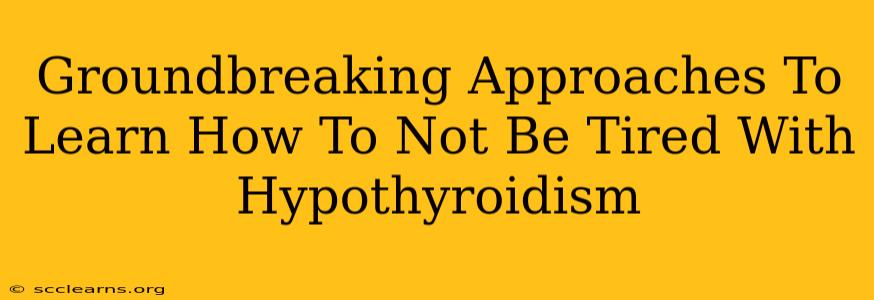Hypothyroidism, an underactive thyroid, leaves many feeling perpetually exhausted. The constant fatigue can significantly impact your quality of life, making even simple tasks feel overwhelming. But there's hope! This article explores groundbreaking approaches to combat hypothyroidism-related tiredness, empowering you to regain your energy and vitality.
Understanding the Fatigue-Hypothyroidism Connection
Before diving into solutions, it's crucial to understand why hypothyroidism causes fatigue. Your thyroid gland produces hormones that regulate your metabolism, impacting everything from your energy levels to your heart rate and body temperature. When your thyroid is underactive, these hormones are produced in insufficient amounts, leading to a slowdown in your metabolic processes. This metabolic slowdown is the primary culprit behind the debilitating fatigue experienced by many hypothyroid individuals.
The Symptoms Beyond Tiredness
It's important to note that fatigue isn't the only symptom of hypothyroidism. Other common signs include:
- Weight gain: Despite dietary changes, you might find it difficult to lose weight.
- Constipation: A sluggish metabolism also affects your digestive system.
- Dry skin and hair: Your body's natural moisturizing processes are impacted.
- Muscle aches and weakness: Your muscles may feel weaker and more prone to pain.
- Depression and difficulty concentrating: Hormonal imbalances can significantly impact mood and cognitive function.
- Intolerance to cold: Your body struggles to regulate its temperature effectively.
If you experience several of these symptoms, it's vital to consult your doctor for a proper diagnosis and treatment plan.
Groundbreaking Approaches to Combat Fatigue
Managing hypothyroidism-related fatigue requires a multifaceted approach. While medication is often a crucial component, lifestyle changes can significantly boost your energy levels:
1. Optimize Your Thyroid Medication
This is paramount. Working closely with your doctor to find the right dosage and type of thyroid hormone replacement medication is crucial for managing your symptoms effectively. Regular blood tests are essential to monitor your hormone levels and ensure your medication is working optimally. Don't hesitate to communicate any persistent symptoms to your physician. They can adjust your medication or explore other options.
2. Prioritize Sleep Hygiene
Adequate sleep is fundamental for overall health, and this is especially true for individuals with hypothyroidism. Aim for 7-9 hours of quality sleep each night. Establish a consistent sleep schedule, create a relaxing bedtime routine, and optimize your sleep environment for darkness and quiet.
3. Embrace Regular Exercise
While it might seem counterintuitive when you're fatigued, regular exercise is a powerful tool for combating hypothyroidism-related tiredness. Start slowly with gentle activities like walking or swimming and gradually increase the intensity and duration as your energy levels improve. Exercise helps improve circulation, boost mood, and enhance metabolic function.
4. Nutritional Powerhouse: The Right Diet
Nutrition plays a vital role in managing hypothyroidism. Focus on a diet rich in:
- Iodine: Essential for thyroid hormone production (but don't supplement without consulting your doctor).
- Selenium: An antioxidant that supports thyroid function. Brazil nuts are an excellent source.
- Zinc: Crucial for thyroid hormone conversion. Pumpkin seeds, lentils, and chickpeas are good choices.
- Iron: Iron deficiency can worsen hypothyroidism symptoms. Lean meats, spinach, and beans are great sources.
Avoid processed foods, refined sugars, and excessive caffeine, which can further deplete your energy levels.
5. Stress Management Techniques
Chronic stress can exacerbate hypothyroidism symptoms, leading to increased fatigue. Incorporate stress-reducing techniques into your daily routine, such as:
- Yoga and meditation: These practices can help calm your mind and body.
- Deep breathing exercises: A simple yet effective way to reduce stress hormones.
- Spending time in nature: Connecting with nature has a calming effect.
6. Consider Alternative Therapies (with Caution)
Some individuals find relief through alternative therapies like acupuncture or massage therapy. However, it's crucial to remember that these therapies should complement, not replace, conventional medical treatment. Always discuss any alternative therapies with your doctor before starting them.
Conclusion: Reclaiming Your Energy
Living with hypothyroidism doesn't mean you have to live with constant fatigue. By adopting these groundbreaking approaches, focusing on medication adherence, lifestyle changes, and stress management, you can significantly improve your energy levels and reclaim your vitality. Remember, consistency is key, and working closely with your healthcare provider is crucial for optimal management of your condition. Take control of your health and begin your journey towards a more energetic and fulfilling life!

